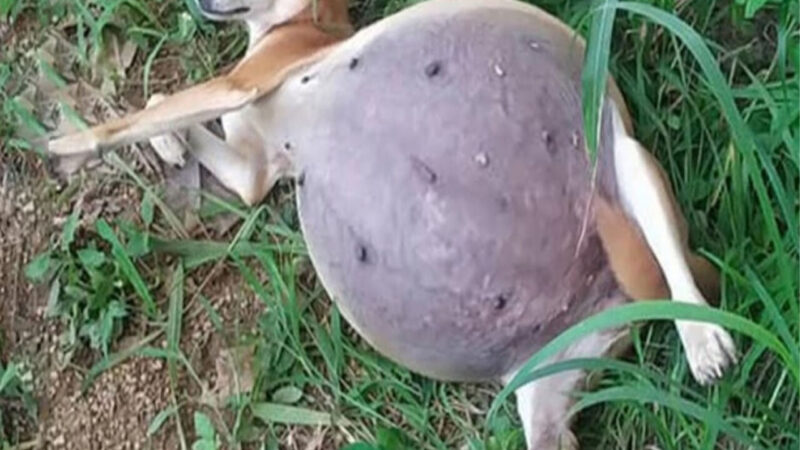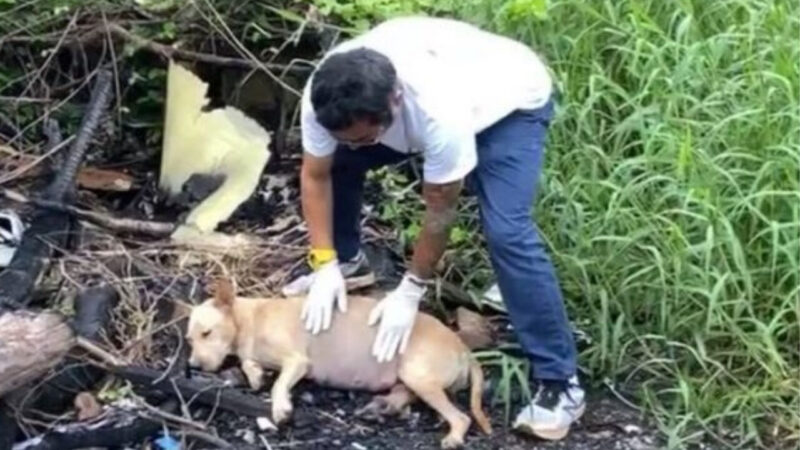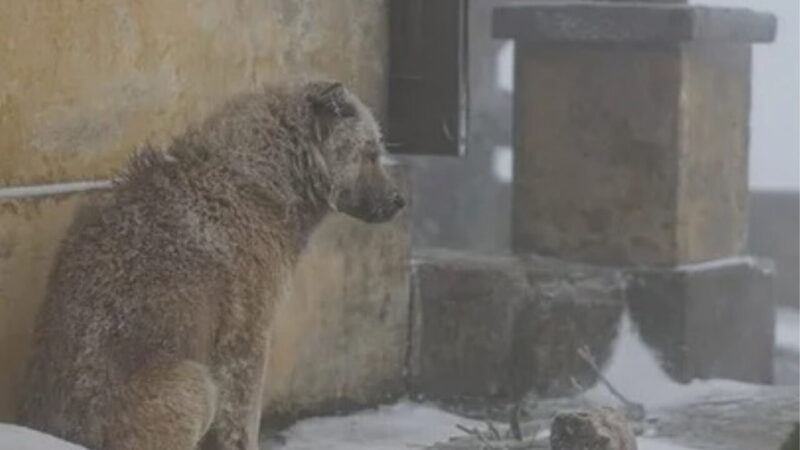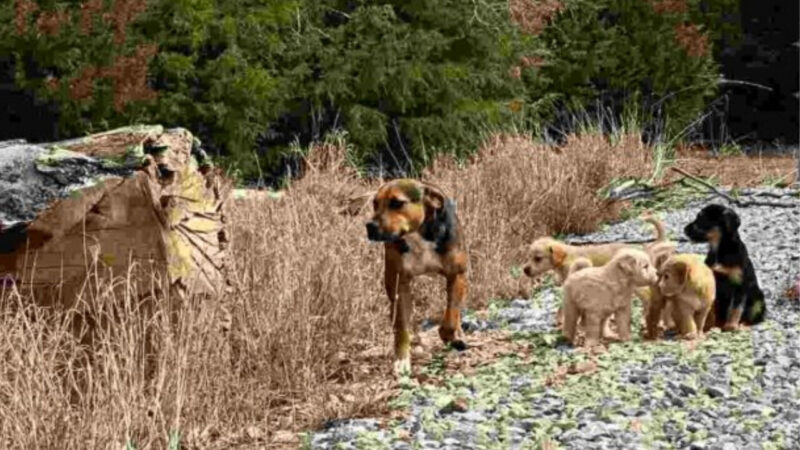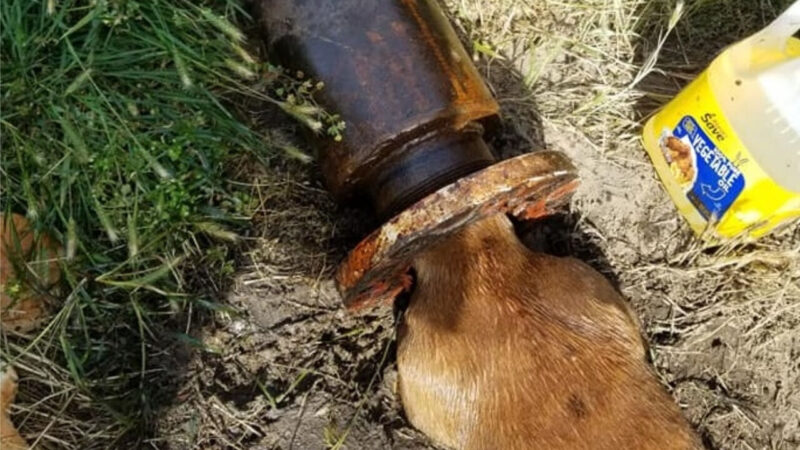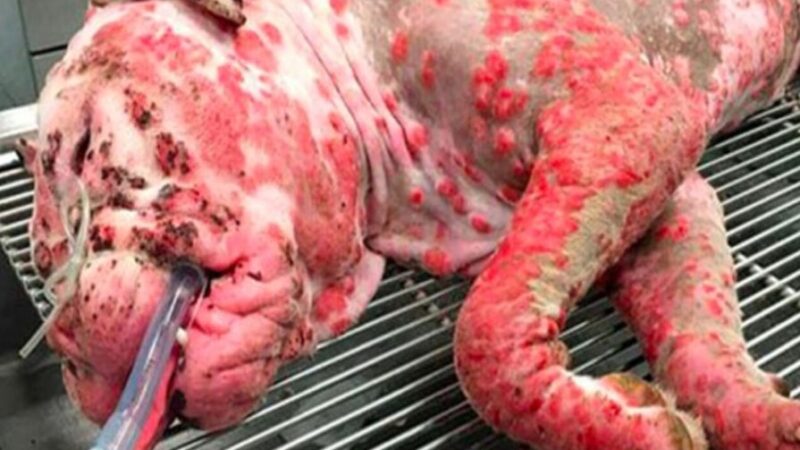Stuck in a filthy mud pit, a chained mother dog gave birth without shelter or comfort, unable to protect her puppies—until someone finally came to her rescue
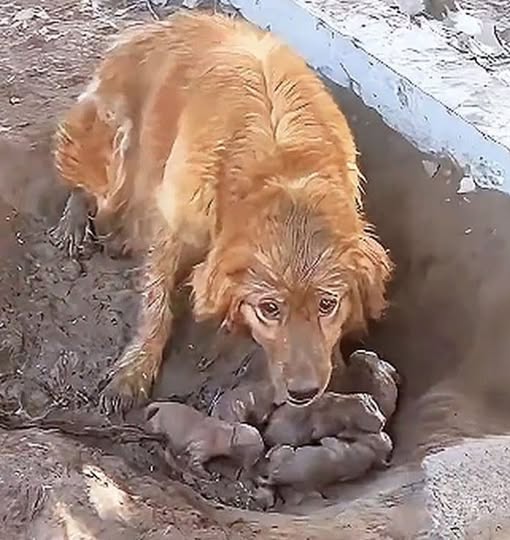
In the corner of an abandoned yard, a mother dog lay shackled to a rusted pole, her frail body curled around her newborn puppies. She had given birth in the only place available to her—a pit of thick, wet mud.
Her babies, blind and helpless, rolled in the dirt, their tiny whimpers barely heard over the rattling of their mother’s chain. She licked them gently, trying her best to care for them despite her own exhaustion.
The puppies’ fur, once soft and clean, was now matted with mud, their tiny paws sinking into the damp ground with each movement.
The mother, too weak to stand for long, could only watch as they wriggled around in the filth. Hunger gnawed at her, but she had nothing to give.
Her body, drained from malnutrition, struggled to produce enough milk to keep her puppies alive.
Days passed, and their situation worsened. Rain pooled in the pit, turning their fragile world into a swamp of cold, sticky sludge.
The mother dog, desperate yet powerless, looked out toward the passing world with tired, pleading eyes. But no one stopped. No one cared.
Until one day, a kind-hearted neighbor noticed. They saw the mother’s thin frame, the muddy puppies struggling beside her, and the chain that kept her bound to a life of suffering.
Unable to ignore the heartbreaking sight, they brought food and water, kneeling beside her and speaking softly. Though wary, the mother devoured the food, her tail twitching faintly in gratitude.

The neighbor knew this wasn’t enough. They called a local rescue group, and soon, a team arrived to save the small family.
The rescuers carefully removed the heavy chain from the mother’s neck—the first taste of freedom she had ever known. Her eyes darted anxiously as they lifted her puppies, wrapping them in warm blankets and carrying them away from the mud that had been their only home.
At the shelter, the transformation began. The puppies were bathed, revealing soft coats beneath the layers of grime. The mother received medical attention, her frail body slowly recovering with proper care and nourishment.
She was no longer just a chained dog left to suffer—she was a survivor.
As weeks passed, the once-miserable family blossomed. The puppies grew strong, playful, and full of life. Their mother, once weak and hopeless, flourished in the safety of her new environment.
She showered her babies with love and began to trust the humans who had saved her.

One by one, the puppies found loving homes. And the mother? She never had to be alone again. The neighbor who had first noticed her suffering adopted her, giving her the love and safety she had never known.
Her story, once one of misery and neglect, became a testament to resilience, kindness, and the power of second chances. No longer chained, no longer helpless—she was finally free.
She spent her days lying in the sun-drenched yard of her new home, eyes half-closed in peace, ears twitching at the sounds of birdsong rather than the clank of chains. Her fur, once dull and patchy, now shimmered in the light, evidence of months of healing and care. Every morning, she greeted her new owner with a wagging tail and soft eyes that spoke volumes—of gratitude, of love, of a bond forged not just in rescue, but in redemption.
Each time a door opened, she no longer flinched. Each time a hand reached out, she welcomed it. She had come to know the difference between pain and affection, between being owned and being loved. Though her journey had begun in darkness, she now lived in the light, surrounded by warmth and dignity.
Occasionally, she would glance at the blanket where she used to nurse her puppies, now clean and folded neatly in the corner of the living room. She remembered their tiny cries, the cold mud, the ache of hunger—but also the moment those cries were answered, the moment kind arms lifted them away from misery.
Her adopted home became her sanctuary. She walked freely now, tail held high, no longer haunted by the chain that once defined her world. On quiet evenings, she would sit beside the neighbor who had saved her, head resting on their lap, content just to be near.
Visitors often commented on her calm demeanor, unaware of the storm she had survived. They saw a gentle dog curled peacefully by the fire, not the broken mother once trapped in mud and silence. But the neighbor knew the truth. They knew every scar told a story, every cautious step was a miracle.
Seasons changed, and as spring returned, so did a newfound energy in her stride. She chased butterflies in the garden, ears flopping joyfully as she darted through patches of sunlight. Laughter filled the air as neighborhood children played nearby, sometimes stopping to pet her or share their snacks, which she accepted with grace.
One evening, a letter arrived at the shelter from one of the families who had adopted a puppy. They included a photo of a healthy, grown dog playing with their children in the backyard. The shelter staff smiled, passing the picture around before sending a copy to her new home.
When her new owner showed it to her, she sniffed the photo curiously, tail swaying. Somehow, as if by instinct, she seemed to recognize the familiar scent in the paper. There was no fear in her eyes—only peace.
Her legacy was more than survival. It was the story of a life rebuilt, of a soul once nearly crushed that rose again with the gentle help of a stranger. And in return, she gave back the one thing no one could ever take from her again—her trust.
As the sun set each day, casting long golden rays over the garden, she would lie beside the flower bed that bloomed where weeds once grew. It was the same yard she had once been spotted in, a place that once echoed with cries of despair. But now it was filled with light, love, and the quiet breaths of a dog who had found her forever.

